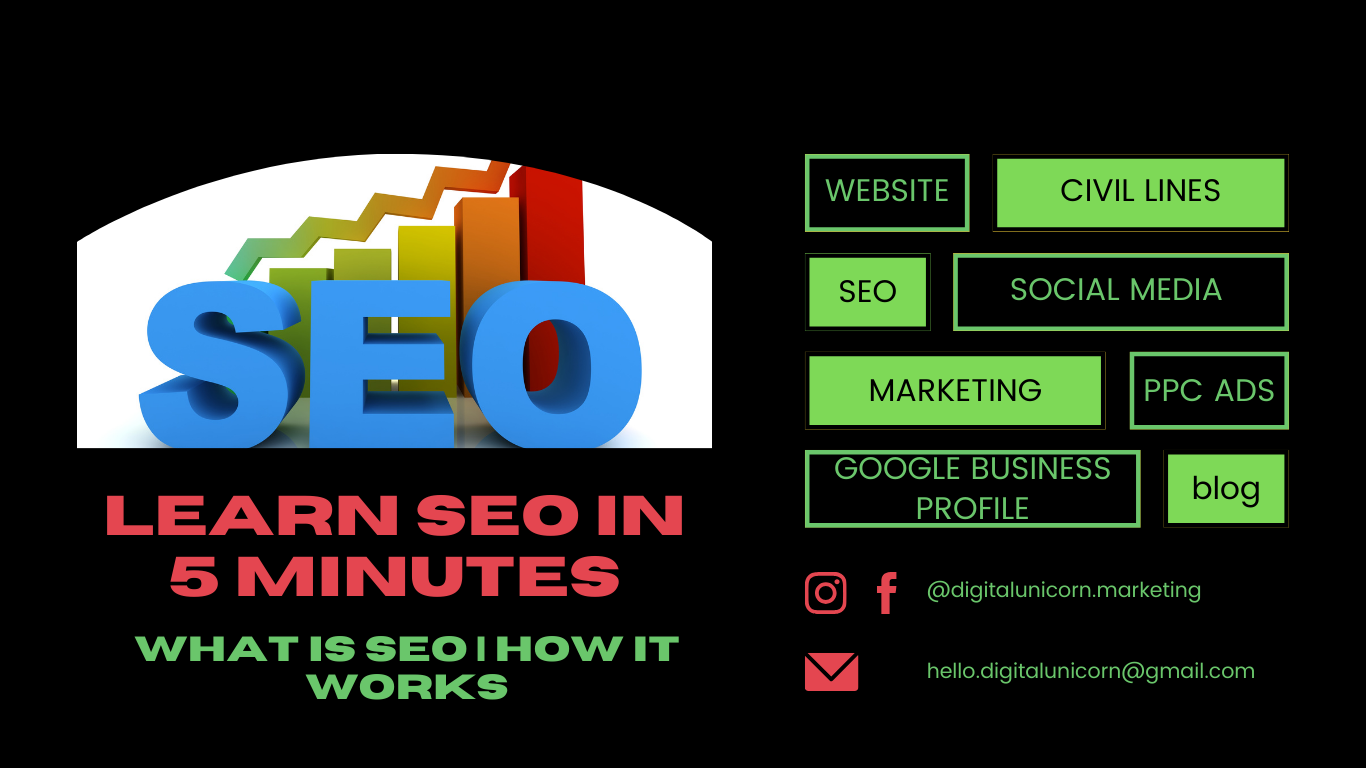SEO in 5 Minutes: What is SEO and How it Works
Introduction
Search Engine Optimization (SEO) is the practice of enhancing your website to increase its visibility when people search for products or services related to your business on search engines like Google, Bing, and Yahoo. Understanding SEO can seem daunting, but it doesn\’t have to be. In just five minutes, you\’ll grasp the basics of SEO and how it works to drive organic traffic to your website.0
What is SEO?
SEO is a digital marketing strategy focused on improving your website\’s ranking in search engine results pages (SERPs). The higher your site ranks, the more likely it is to attract clicks and visitors. SEO involves various techniques, including keyword research, content optimization, and link building, all aimed at making your site more appealing to search engines.
How SEO Works
SEO operates on three main pillars: technical SEO, on-page SEO, and off-page SEO.
1. Technical SEO
Technical SEO refers to the optimization of your website\’s backend structure. It ensures that your site is easy for search engines to crawl and index. Key elements include:
- Site Speed: Faster loading times improve user experience and search rankings.
- Mobile-Friendliness: Optimizing for mobile devices is crucial as more users browse the web on smartphones.
- Secure Sockets Layer (SSL): HTTPS encryption secures your site and boosts rankings.
- XML Sitemaps: Help search engines understand your site structure and find all your pages.
2. On-Page SEO
On-page SEO focuses on optimizing individual pages to rank higher. This includes:
- Keyword Optimization: Use relevant keywords naturally in your content, titles, headings, and meta descriptions.
- Quality Content: High-quality, valuable content that answers users\’ queries improves engagement and rankings.
- Meta Tags: Effective meta titles and descriptions enhance click-through rates from SERPs.
- Internal Linking: Links within your site improve navigation and help distribute page authority.
3. Off-Page SEO
Off-page SEO involves actions taken outside your website to impact rankings. This primarily includes:
- Backlinks: Getting other reputable sites to link to your content. High-quality backlinks signal to search engines that your content is trustworthy.
- Social Signals: Engagement on social media platforms can indirectly influence SEO by driving traffic and increasing visibility.
- Guest Blogging: Writing for other sites builds authority and generates backlinks.
SEO Best Practices
To make the most of your SEO efforts, follow these best practices:
- Conduct Keyword Research: Use tools like Google Keyword Planner to find relevant keywords.
- Create High-Quality Content: Focus on producing informative, engaging, and original content.
- Optimize Your Images: Use descriptive filenames and alt text to help search engines understand your images.
- Monitor Your Performance: Use tools like Google Analytics and Search Console to track your SEO progress and adjust strategies as needed.
- Stay Updated: SEO is constantly evolving. Keep up with the latest trends and algorithm updates to maintain your rankings.
Common SEO Mistakes to Avoid
Avoid these pitfalls to ensure your SEO efforts are effective:
- Keyword Stuffing: Overusing keywords can lead to penalties.
- Ignoring Mobile Optimization: A non-mobile-friendly site can hurt your rankings.
- Neglecting Meta Descriptions: Missing or poorly written meta descriptions can reduce click-through rates.
- Poor Site Structure: A confusing site layout can hinder search engine crawling and indexing.
READ MORE ARTICLES
- Supercharge Your SEO with Content Marketing
- Unlock Your Website’s Potential: SEO Keyword Research Made Easy
- Master On-Page SEO Techniques: Boost Your Rankings
- Unlocking SEO Success: Key Components of SEO Strategy
- Top SEO Agencies in Ludhiana: Boosting Your Online Presence
FAQs
1. What is the main purpose of SEO?
The main purpose of SEO is to increase your website\’s visibility in search engine results, thereby driving more organic traffic to your site.
2. How long does it take to see results from SEO?
SEO is a long-term strategy. It can take several months to see significant results, but the benefits are lasting.
3. Can I do SEO myself?
Yes, many SEO practices can be done by yourself, especially with the wealth of online resources available. However, hiring an SEO professional can ensure more advanced and effective techniques are implemented.
4. What are keywords in SEO?
Keywords are specific words or phrases that users type into search engines. They are central to SEO, helping to connect search queries with relevant content.
5. Why is mobile optimization important for SEO?
With the majority of users accessing the internet via mobile devices, having a mobile-friendly site is crucial for user experience and is a significant ranking factor for search engines.
Multi-Stage Call to Action (CTA)
Stage 1: Awareness
Want to learn more about SEO and how it can benefit your business? Download our free SEO starter guide now!
Stage 2: Consideration
Ready to enhance your website\’s SEO? Contact us for a free consultation at +916280082011 or email hello.digitalunicorn@gmail.com.
Stage 3: Decision
Partner with us to develop a robust SEO strategy tailored to your business needs. Call +916280082011 or email hello.digitalunicorn@gmail.com to get started.
By understanding and implementing these SEO basics, you can significantly improve your website\’s visibility and attract more organic traffic. For personalized assistance and advanced strategies, don\’t hesitate to reach out at +916280082011 or email hello.digitalunicorn@gmail.com.


Recent Comments